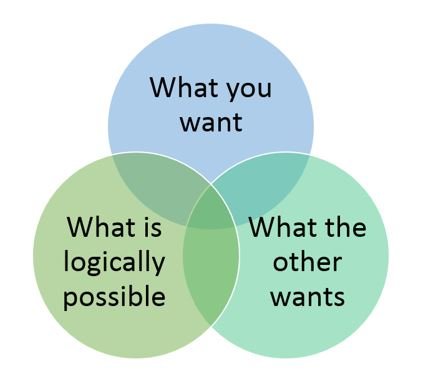How to Negotiate Properly
How to Negotiate Properly
In order to negotiate properly, you need to identify three things:

- Exactly what you want.
- What the other person wants.
- What is logically possible.
Look at the small intersection that satisfies all three sets.
This is where you will find your negotiated solution.
Notice how small the negotiated solution is, when compared to the whole model.
The negotiated solution represents a severely restricted set of circumstances; and that is why a negotiated settlement is sometimes difficult to find.
This diagram suggests three common negotiation errors:
- Trying to get everything YOU want, without giving much regard to what the other party wants, (The "Crush your enemy" approach to negotiation).
- Giving too much away to the other person, in the hope they will be nice to you in return, ("The Supplicant" - Theresa May's - approach to negotiation).
- Ignore the reality of the situation; and create a fantasy, make-believe solution that pleases both parties but cannot be implemented in practice, ("The Wishful thinking", approach to negotiation).
Please note these three common errors and avoid them.
Success in negotiation requires that you make careful preparations. You will perform better in negotiations, if you are well prepared.
Preparation includes analysing the three fields listed above, starting with the first field, "what you want".
The "what you want" field can be broken into three sub-sets.
- What you MUST have.
- What you would like to have.
- What is desirable, but what you could live-without and therefore could act as a "negotiable variable". (A negotiable variable is a factor that you can add to the negotiation to make your proposition more attractive to the other person, without damaging your own self-interest).

1. What you must have.
This means what it says. These are the major elements that you consider essential. You cannot agree to any situation which omits these major elements.
2. What you would like to have.
These are NOT major elements. These are factors that are important to you, but are not essential to your well-being and therefore do not fall into the first category.
3. What is desirable but what you could live without and could act as a "negotiable variable".
These are the many minor desirable items which you could forego, in exchange for a concession from the other side.
It is very important that you list all the things you want, but could live without, and therefore could trade as negotiable variables.
Prepare a list of negotiable variables.
Remember what a negotiable variable is. It is a factor that you can add into the equation (or one that you can remove) in order make your proposition more attractive to the other person without damaging your own self-interest.
The ideal is to have a nice long list of negotiable variables that are perceived as high value to the other person, but they are of low cost to you to provide.
4. To be super-successful, more preparation is required.
To the degree possible, try to predict the same three sets from your opponent's perspective. What things do you think your opponent:
- Must have?
- Would very much like to have?
- Could easily give away?
If you can pre-empt their thinking in these matters, then you have a greater chance of finding a beneficial negotiated settlement.
5. Finally, identify any logical constraints.
Identify what is NOT possible.
Everything has limits, including the negotiated solution.
You need to know what are the constraints imposed upon both parties?
- What are the practical constraints?
- What are the legal constraints?
- The time constraints?
- The company-policy constraints?
- The moral constraints? We think about the moral constraints because we want to be nice people.
Learn about all the above skills and more, on our one-day Negotiation Skills Training Course which we can deliver at your premises.
Blogs by Email
Do you want to receive an email whenever we post a new blog? The blogs contain article 5-10 minutes long - ideal for reading during your coffee break!
Further Reading in Communication - Persuasive Communication
-
How to be more persuasive
How to make yourself more persuasive, by working on refining the communication of your message.
Read Article > -
Everything is Negotiable
In business you have to trade with other people, which involves negotiating. Therefore, it is important that you learn the proper principles of negotiation, in order to get the best possible outcome for your organisation.
Read Article > -
Tips to Improve your communication skills
Tips to improve your communication skills It's true, isn't it, that almost everyone would benefit if they improved their ability to communicate? Since, in order to achieve your goals, you need to gain the cooperative assistance of others, and since you are not telepathic, then you rely on your ability to...
Read Article > -
Good and Bad Speech Habits
Words are powerful, but bad speech habits can affect your credibility with friends and colleagues. Bad speech habits may even affect your progress in your professional life. Look at these common speech habits and see which ones you should ditch.
Read Article > -
The Way You Speak to People
Learn to speak properly to people and you will gain their willing cooperation to help you. Negative talk tends to repel people.
Read Article >
Looking for Communication Skills Training?
If you're looking to develop your Persuasive Communication Skills, you may find this Communication Skills Training Course beneficial:
Open Training Course Pricing and Availability
Next Open Course Starts in 6 days, London - Central, places available




